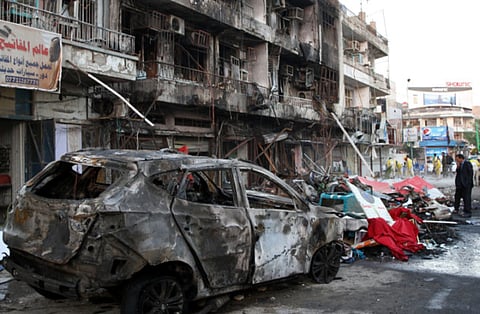US air strikes target Daesh leadership
Unclear whether Abu Bakr Al Baghdadi was killed in strikes

Baghdad: US warplanes launched air strikes on what US officials said was a gathering of Daesh commanders near the militant-held city of Mosul on Friday, in one of the most prominent assaults on the group’s leadership since the air war started here in August.
A spokesman for US Central Command could not confirm whether Daesh leader Abu Bakr Al Baghdadi was at the gathering targeted on Friday. The strikes destroyed a convoy of 10 armed trucks, the spokesman, Col Patrick Ryder, said. According to Centcom, the vehicles appeared to be pickups with gun mounts.
“We cannot confirm if Abu Bakr Al Baghdadi was among those present” in the convoy destroyed near Mosul, Ryder said, using an alternative acronym for the Daesh.
Mosul, a city of roughly 1.5 million people, was seized by Daesh militants in June. Baghdadi declared an ‘Islamic caliphate’ from that northern Iraqi city in his first appearance as the group’s leader on July 5. Their military victory in Mosul granted the Daesh command over one of Iraq’s largest cities, where they have imposed a strict version of Sharia on the local population, residents say.
Al Baghdadi, an Iraqi born in Samarra, is said to have been working as a preacher when the United States invaded Iraq in 2003. He then turned to militancy and was detained by US forces at Camp Bucca for four years.
It was there that Al Baghdadi is believed to have met and trained with Al Qaida operatives, eventually rising to lead the Daesh. His militant group controls vast tracts of land that straddle the border between Iraq and Syria.
Also on Friday, US warplanes struck several targets in Iraq’s western Anbar province, Ryder said. Several of the strikes, near Al Qaim at the Syrian border, destroyed an Daesh vehicle and several checkpoints, he said.
On Saturday, Iraqi government officials and tribal chiefs in Anbar reported fresh US air strikes near Al Qaim that they said also targeted and killed some of Al Baghdadi’s top aides. The raids could not be confirmed.
Daesh militants have overrun large areas of Anbar in recent weeks and control a majority of the province. Anbar was the epicentre of the Sunni insurgency against US troops during the Iraq war, but local tribal leaders eventually turned against the extremists.
Those same Sunni tribesmen are requesting US assistance to beat back Daesh advances in Anbar, where the militants have massacred members of tribes resisting their rule. Since late October, Daesh has executed hundreds of members of the Albu Nimr tribe in Anbar, tribal leaders said. The Obama administration on Friday authorised the deployment of an additional 1,500 troops to Iraq, including trainers and advisers who will specifically deploy to Anbar province.
The difficulty of determining who may have been killed in the weekend strikes reflects one of the many challenges the Obama administration faces as it extends its air campaign in Iraq while limiting the number of US personnel on the ground.
While the United States has sophisticated systems to collect intelligence from the air, its small military footprint makes it harder to determine the outcome of air raids. That is even more true of US strikes in Syria, where there is no American military presence.
The limited US footprint in Iraq also poses challenges for other important tasks, such as assessing the abilities of Iraqi security forces. US officials say Iraqi forces must lead the fight against militants even as they prepare to send additional American troops to retrain nine brigades of the Iraqi army, whose shortcomings were laid bare by the Daesh’s success this summer.
But US officials say that three months of steady strikes against the Daesh in Iraq has prompted the group to alter its tactics, forcing them to move in smaller numbers and constraining their ability to communicate and plan attacks.
While the number of American troops would roughly double if Congress approves funding for Obama’s force expansion, the White House has pledged no US soldiers will take part in combat in Iraq.
Sign up for the Daily Briefing
Get the latest news and updates straight to your inbox



